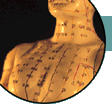|
 |
Introduction to TCM

Basics of TCM

• Yin-Yang | Five Elements

Zang-Fu Theories

• Zang Organs | Fu Organs

Classification of Antineoplastic Herbal Medicines

Characteristics of Herbal Medicines

Diagnose

• By Auscultation & Olfaction
• By Inspection

Prescriptions

Theories of Channels (Meridians) and Collaterals

Reference: A Modern View of the Immune System

Differentiation of Syndromes

• 8 Principles
• 6 Channels 4 Stages
• Syndromes of Zang-Fu Organs

Etiology

• Exogenous
| Pestilential
• Pathogenic Factors
• Emotional

Materia Medica


Back to Home

|
 |

Differentiating Syndromes of the Stomach
Loss and deficiency of stomach yin
Dryness of the mouth and throat, stomach-ache and hunger without desire to eat, dry stool, red tongue proper with scanty fluid, thready and rapid pulse.
Insufficiency of stomach yin makes the body fluid fail to support the upper organs, causing dryness of the mouth and throat. Insufficiency of stomach fluid leads to the dysfunction of stomach reception manifested by hunger without desire to eat. Deficiency of stomach yin also gives rise to the disturbances of xu fire, manifesting as stomach pain. Insufficiency of stomach yin causes dry stool. Red tongue proper with scanty fluid and a thready rapid pulse are signs of yin deficiency producing heat.
Preponderance of stomach fire
Burning pain of the epigastric region, vomiting, nausea, acid regurgitation, constipation, thirst with preference for cold drinks, swelling, pain, ulceration and bleeding of the gums, hunger with excessive eating, foul breath, red tongue proper with yellow coating, slippery and rapid pulse.
Accumulation of heat in the stomach leads to a dysfunction of qi activities resulting in a burning pain of the epigastrium. Preponderance of heat in the stomach consumes the yin of the stomach causing thirst with a preference for cold drinks. Since pathogenic fire accelerates food, there is hunger with excessive eating. Branches of the stomach channel travel up to the gum, therefore when pathogenic stomach heat flows upward, it causes welling, pain, ulceration and bleeding of the gums. An accumulation of stomach heat leading to a dysfunction of stomach qi descent causes foul breath, vomiting, nausea, and acid regurgitation. A red tongue proper with yellow coating and a slippery rapid pulse are signs of stomach heat.
Retention of Food in the Stomach
Distension or pain in the epigastrium, foul belching, acid regurgitation, no desire to eat, vomiting, abnormal bowel movements, diarrhea or constipation, thick sticky tongue coating, and slippery pulse.
Retention of blood in the stomach blocks the qi activities of the middle jiao, so there is distension or pain in the epigastrium. Foul belching, acid regurgitation, no desire to eat, and vomiting are caused by a dysfunction of stomach qi descent, which then causes the upward flow of turbid qi. Retention of food in the stomach affects the transportation and transformation functions of the spleen, producing abnormal bowel movements, i.e., diarrhea or constipation. A thick sticky tongue coating and a slippery pulse are signs of food retention.
Related Subjects
Read more on description of the main syndromes of other zang-fu organs:
Heart,
Liver,
Spleen,
Lung,
Kidney,
Small Intestine,
Large Intestine,
Urinary Bladder, and
Gall Bladder.
|

|
|
|
|
|
 |

|
WHAT IS TRADITIONAL CHINESE MEDICINE?

Photo © Image DJ Image Dictionary
With over 3000 years of experience, Traditional Chinese Medicine (TCM) has
remain one of the many fascinating areas in ancient Chinese culture.
First known to be documented in the Yellow Emperor's Canon of Medicine,
TCM is believed to have been practised in as early as 475 to 221 B.C.
The field of working knowledge of TCM stretches from anything related to
general healthcare practice to the philosophy of the mind, the logic of life,
religion, and even to as far as cosmology and astronumerology. This is why
in order to thoroughly understand the concepts behind TCM, one must be
comprehensive in learning and embracing the Chinese culture as a whole.
Just as Douglas Hoff put it when he explained about accupuncture, "The systems
of TCM uses the concepts of elements and meridians and are completely immersed
in the Asian cosmology which takes shape through the religions." The meridian-brain mechanism,
the fundamental working concept of acupuncture, in which the pain block from the message
that the needle or burning cone of herbs gives to the point of stimulus,
was only found centuries later by the West through science and technology.
|
| |
|
MESSAGE FROM THE EDITOR – MARCH 2020
 Thank you for visiting this TCM and acupuncture information website.
If you have previously been to this website, you might have
noticed that some of the pages on ancient historical ideas and
holistic thinkings related to Chinese metaphysics are temporarily taken offline.
This is because I will be revamping the whole website and be moving
those information into a new \"Ancient Chinese Culture\" section
so as to reflect a more current perspective on the interpretation
of some of the fundamental concepts as well as to include
some of the latest information in the area.
But if you have just found this website for the very first time, I welcome you again and
wish you could find what you require and, hopefully, you could also be benefitted
from reading the articles I published on this website.
Thank you for visiting this TCM and acupuncture information website.
If you have previously been to this website, you might have
noticed that some of the pages on ancient historical ideas and
holistic thinkings related to Chinese metaphysics are temporarily taken offline.
This is because I will be revamping the whole website and be moving
those information into a new \"Ancient Chinese Culture\" section
so as to reflect a more current perspective on the interpretation
of some of the fundamental concepts as well as to include
some of the latest information in the area.
But if you have just found this website for the very first time, I welcome you again and
wish you could find what you require and, hopefully, you could also be benefitted
from reading the articles I published on this website.
Please be patient and do come and check out this website frequently as it's being revamped.
Raymond Cheng, PhD DPA FRSA FRSPH

March 28, 2020.
|

|
IMPORTANT NOTICE AND DISCLAIMER

 This website is published, edited and designed by Raymond Cheng,
and reflects only and only his personal views and opinions in his individual capacity.
The information available at this website is not intended
directly or by implication to either diagnose or treat any
medical, emotional, or psychological condition or disorder.
It is also not intended to create a physician-patient relationship
between you and I or between you and Wyith Institute™ and The Office of Dr Raymond K K Cheng.
The information here is not a substitute for advice and treatment provided
by your physician or by another healthcare professional.
It is always recommended that consultation with local healthcare providers
be obtained for any of your specific health or medical concerns.
Furthermore, any products that can be purchased (yet you can see I don't have much
to sell here) through advertisers' banners or through links to other websites
are not either explicitly or implicitly given any warranty or endorsement
by me, my colleagues, Wyith Institute™ or any of its associated businesses.
This website is published, edited and designed by Raymond Cheng,
and reflects only and only his personal views and opinions in his individual capacity.
The information available at this website is not intended
directly or by implication to either diagnose or treat any
medical, emotional, or psychological condition or disorder.
It is also not intended to create a physician-patient relationship
between you and I or between you and Wyith Institute™ and The Office of Dr Raymond K K Cheng.
The information here is not a substitute for advice and treatment provided
by your physician or by another healthcare professional.
It is always recommended that consultation with local healthcare providers
be obtained for any of your specific health or medical concerns.
Furthermore, any products that can be purchased (yet you can see I don't have much
to sell here) through advertisers' banners or through links to other websites
are not either explicitly or implicitly given any warranty or endorsement
by me, my colleagues, Wyith Institute™ or any of its associated businesses.
|

|
|

 This website is published, edited and designed by Raymond Cheng,
and reflects only and only his personal views and opinions in his individual capacity.
The information available at this website is not intended
directly or by implication to either diagnose or treat any
medical, emotional, or psychological condition or disorder.
It is also not intended to create a physician-patient relationship
between you and I or between you and Wyith Institute™ and The Office of Dr Raymond K K Cheng.
The information here is not a substitute for advice and treatment provided
by your physician or by another healthcare professional.
It is always recommended that consultation with local healthcare providers
be obtained for any of your specific health or medical concerns.
Furthermore, any products that can be purchased (yet you can see I don't have much
to sell here) through advertisers' banners or through links to other websites
are not either explicitly or implicitly given any warranty or endorsement
by me, my colleagues, Wyith Institute™ or any of its associated businesses.
This website is published, edited and designed by Raymond Cheng,
and reflects only and only his personal views and opinions in his individual capacity.
The information available at this website is not intended
directly or by implication to either diagnose or treat any
medical, emotional, or psychological condition or disorder.
It is also not intended to create a physician-patient relationship
between you and I or between you and Wyith Institute™ and The Office of Dr Raymond K K Cheng.
The information here is not a substitute for advice and treatment provided
by your physician or by another healthcare professional.
It is always recommended that consultation with local healthcare providers
be obtained for any of your specific health or medical concerns.
Furthermore, any products that can be purchased (yet you can see I don't have much
to sell here) through advertisers' banners or through links to other websites
are not either explicitly or implicitly given any warranty or endorsement
by me, my colleagues, Wyith Institute™ or any of its associated businesses.



 Thank you for visiting this TCM and acupuncture information website.
If you have previously been to this website, you might have
noticed that some of the pages on ancient historical ideas and
holistic thinkings related to Chinese metaphysics are temporarily taken offline.
This is because I will be revamping the whole website and be moving
those information into a new \"Ancient Chinese Culture\" section
so as to reflect a more current perspective on the interpretation
of some of the fundamental concepts as well as to include
some of the latest information in the area.
But if you have just found this website for the very first time, I welcome you again and
wish you could find what you require and, hopefully, you could also be benefitted
from reading the articles I published on this website.
Thank you for visiting this TCM and acupuncture information website.
If you have previously been to this website, you might have
noticed that some of the pages on ancient historical ideas and
holistic thinkings related to Chinese metaphysics are temporarily taken offline.
This is because I will be revamping the whole website and be moving
those information into a new \"Ancient Chinese Culture\" section
so as to reflect a more current perspective on the interpretation
of some of the fundamental concepts as well as to include
some of the latest information in the area.
But if you have just found this website for the very first time, I welcome you again and
wish you could find what you require and, hopefully, you could also be benefitted
from reading the articles I published on this website.